The Cia s War on Trump Continued
2017
January 20, 2017
Inauguration
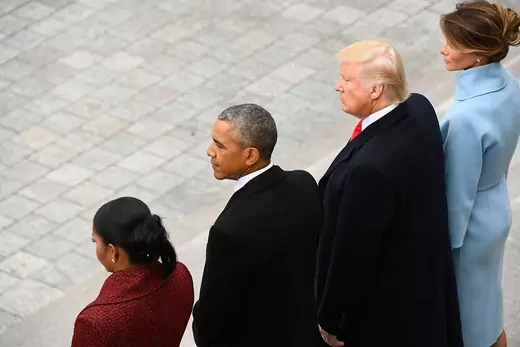
Former President Barack Obama and Michelle Obama stand with President Donald J. Trump and Melania Trump at the 2017 inauguration. Jack Gruber/Pool/Reuters
In his inaugural address, President Donald J. Trump announces an America First approach to foreign policy and trade, which centers on reducing U.S. trade deficits and rebalancing burden sharing within alliances. Trump promises to "unite the civilized world against radical Islamic terrorism" and emphasizes that "it is the right of all nations to put their own interests first."
2017
January 23, 2017
TPP Withdrawal
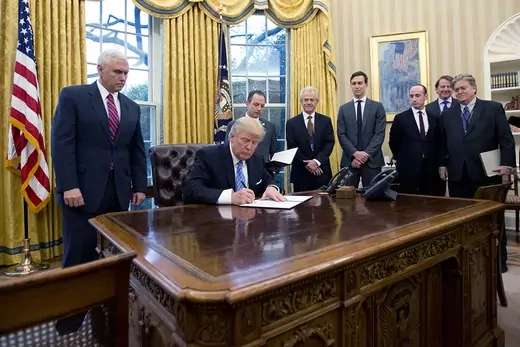
Trump signs an executive order withdrawing the United States from the Trans-Pacific Partnership. Ron Sachs/Pool/Getty Images
Trump directs the Office of the U.S. Trade Representative to withdraw the United States from the Trans-Pacific Partnership, a twelve-country, Asia-focused trade agreement the United States had championed under the Barack Obama administration.
2017
January 27, 2017
Travel Ban
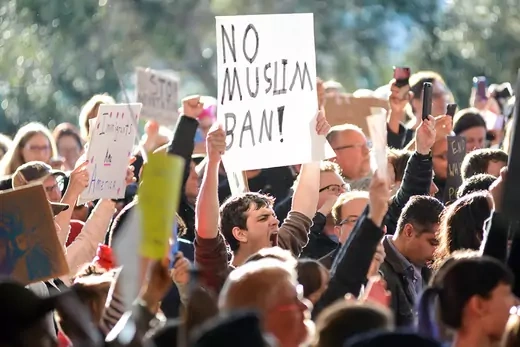
Demonstrators protest outside San Francisco International Airport. Kate Munsch/Reuters
The president signs an executive order banning nationals of six Muslim-majority countries from traveling to the United States for ninety days. The order, later amended to include an additional two countries, also indefinitely freezes refugee intake from Syria. Days later, a federal judge in Washington State blocks part of the order, beginning a series of judicial challenges. That same week, Trump signs two other executive orders concerning immigration. One directs federal funds to the construction of a wall along the U.S.-Mexico border, and the other bars so-called sanctuary cities from receiving federal grants.
2017
April 7, 2017
Striking Syria
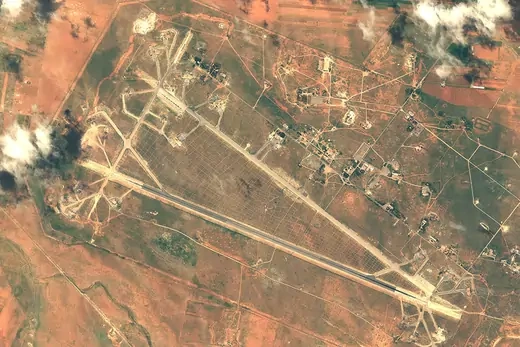
Satellite imagery shows the Shayrat Air Base, outside of Homs, following a U.S. missile strike. Digital Globe/Getty Images
In retaliation for Syrian President Bashar al-Assad's use of the chemical weapon sarin in an attack against civilians, Trump authorizes a limited cruise missile strike on the regime-controlled Shayrat Air Base. U.S.-sponsored measures against the regime at the UN Security Council are blocked by Russia, part of a long-running trend.
2017
May 18, 2017
Revisiting NAFTA
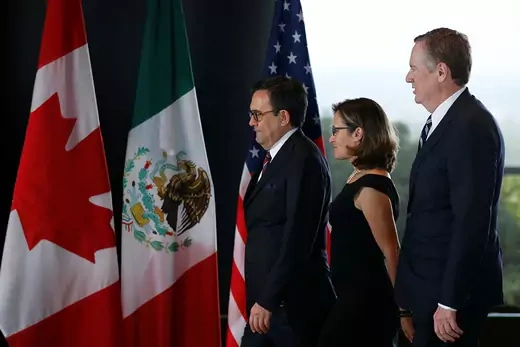
Mexican Economy Minister Ildefonso Guajardo, Canadian Foreign Minister Chrystia Freeland, and U.S. Trade Representative Robert Lighthizer meet on NAFTA in Ottawa. Chris Wattie/Reuters
U.S. Trade Representative Robert Lighthizer notifies Congress [PDF] of the White House's intent to "modernize" the North American Free Trade Agreement (NAFTA). The administration seeks to renegotiate the agreement, whose other parties are Canada and Mexico, to address the U.S. trade deficit in goods, eliminate subsidies it sees as unfair, restore manufacturing jobs, and ease intellectual property restrictions.
2017
May 20 – 27, 2017
Trump Goes Abroad
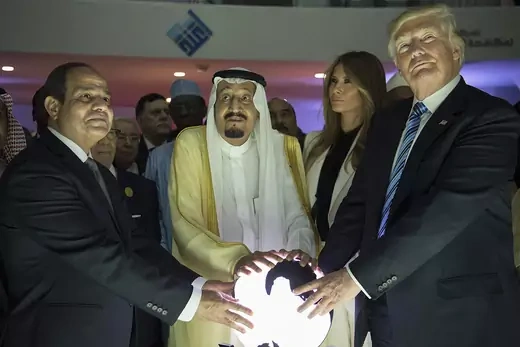
Trump and Arab leaders inaugurate a counterterrorism center in Riyadh. Anadolu Agency/Getty Images
Trump makes his first trip abroad as president, traveling to Saudi Arabia, Israel, the West Bank, Italy, Vatican City, Belgium, and Italy. He attends a summit in Riyadh with leaders from more than fifty Arab- and Muslim-majority nations, where he delivers a speech calling on the Muslim world to unite against terrorism. In Brussels, Trump addresses North Atlantic Treaty Organization (NATO) heads of state and government, calling on each of them to "finally contribute their fair share" to the alliance. He does not, however, explicitly state his support for NATO's Article 5 mutual defense clause. In Italy, Trump participates in the Group of Seven (G7) meeting, where the United States joins a joint declaration on fighting protectionism but withholds its support from one reaffirming the Paris climate accord.
2017
June 1, 2017
Leaving the Paris Agreement
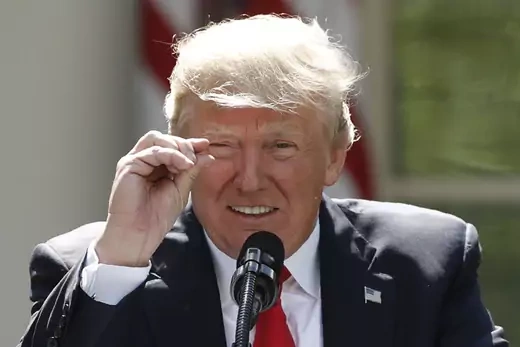
Trump refers to the magnitude of global climate change as he announces his decision to withdraw the United States from the landmark Paris climate agreement. Kevin Lamarque/Reuters
In a speech, Trump announces that the United States will withdraw from the 2015 Paris climate accord, another agreement negotiated by Obama. Trump criticizes the 195-country agreement, under which the United States would have voluntarily limited its carbon emissions, for constricting U.S. sovereignty, harming American workers, and disadvantaging the United States economically.
2017
June 5, 2017
Navigating Qatar's Crisis

A girl holds a picture depicting Qatari Emir Sheikh Tamim bin Hamad al-Thani. Naseem Zeitoun/Reuters
Saudi Arabia, the United Arab Emirates, Bahrain, and Egypt sever diplomatic relations with Qatar, alleging it supports terrorism and Iranian adventurism. Trump initially welcomes the move even as Secretary of State Rex Tillerson and Secretary of Defense Jim Mattis work to reinforce the U.S. relationship with Qatar, which hosts the al-Udeid Air Base, the regional headquarters of U.S. Central Command.
2017
June 16, 2017
Rolling Back Ties With Cuba
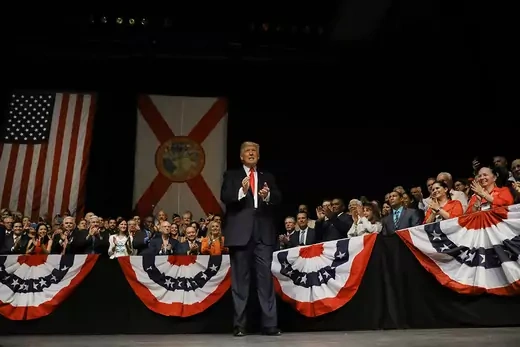
Trump prepares to deliver a speech on U.S.-Cuba relations. Carlos Barria/Reuters
Trump announces a partial rollback of the Obama administration's rapprochement with Cuba. Under the newly announced guidelines, the United States will reinstate restrictions on travel and trade with Cuba without severing diplomatic ties. In September 2017, the Trump administration reduces the U.S. embassy staff in Havana by half.
2017
July 5 – 8, 2017
Trump Meets Putin
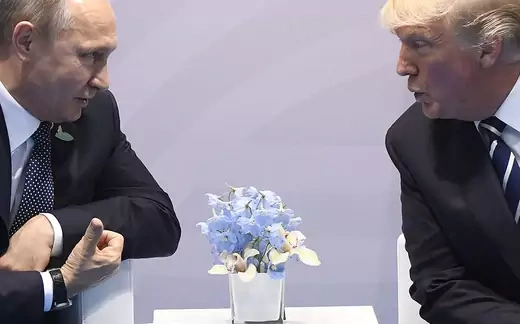
Trump and Russian President Vladimir Putin meet on the sidelines of the G20 summit in Hamburg, Germany. Saul Loeb/Getty Images
In a visit to Warsaw, Trump delivers an address in which he emphasizes a civilizational struggle for the West and, for the first time, explicitly references NATO's mutual defense clause. In Germany, Trump attends the Group of Twenty leaders' meeting, where he meets for the first time as president with Russian President Vladimir Putin. The meeting is highly anticipated amid ongoing investigations into Russian interference in the 2016 U.S. elections.
2017
August 8, 2017
A War of Words With North Korea
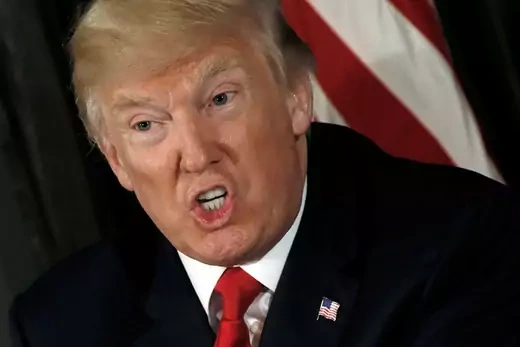
Trump speaks about North Korea during a briefing. Jonathan Ernst/Reuters
After Pyongyang threatens to launch ballistic missiles into the waters around Guam, Trump warns that North Korea will be met with "fire and fury" if it continues to threaten launches. The remark initiates hostile rhetorical exchanges that culminate with North Korean leader Kim Jong-un insulting Trump.
2017
August 21, 2017
A New Afghan Strategy
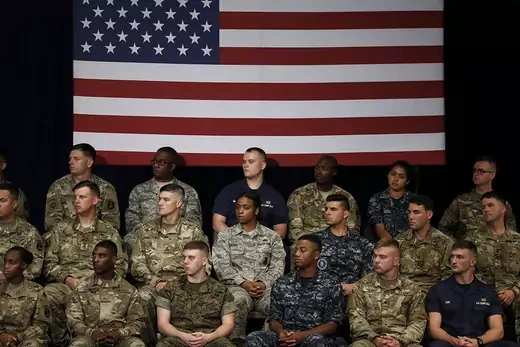
Military personnel watch as Trump announces his strategy for the war in Afghanistan. Joshua Roberts/Reuters
Trump, in a speech, announces a counterterrorism-focused approach to the U.S. mission in Afghanistan. He announces that he will deploy more U.S. troops there and loosen their rules of engagement. He avoids mentioning deployment timetables.
2017
September 5, 2017
Winding Down DACA
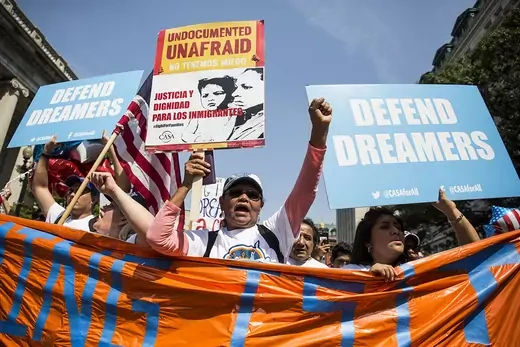
Protesters demonstrate against the Trump administration's announcement that it will end the Deferred Action for Childhood Arrivals program. Zach Gibson/Getty Images
Trump and Attorney General Jeff Sessions announce that the Obama-era Deferred Action for Childhood Arrivals (DACA) program will begin winding down in six months, leaving approximately eight hundred thousand beneficiaries vulnerable to deportation. Trump encourages Congress to legislate a successor to DACA.
2017
September 19, 2017
A UN Debut
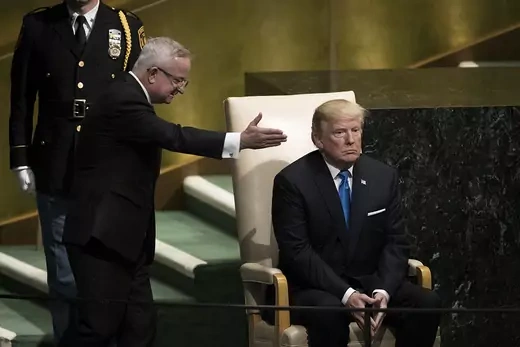
Trump waits to address the UN General Assembly in New York. Drew Angerer/Getty Images
Trump, addressing the UN General Assembly for the first time, threatens to "totally destroy" North Korea if the United States is "forced to defend itself or its allies." Echoing his inaugural address, Trump emphasizes sovereignty and tells the gathered world leaders that the United States does "not seek to impose our way of life on anyone, but rather to let it shine as an example for everyone to watch."
2017
October 13, 2017
Revisiting the Iran Deal
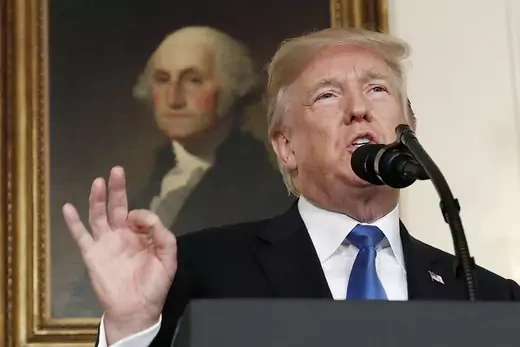
Trump speaks about the Iran nuclear deal. Kevin Lamarque/Reuters
After months of deliberation, Trump announces that he will not recertify Iran's compliance with the 2015 Joint Comprehensive Plan of Action to Congress (JCPOA), saying that Iran's behavior violates the spirit of the agreement. Trump does not take steps to abrogate the JCPOA; instead, he asks Congress to deliberate on reimposing sanctions.
2017
November 3 – 14, 2017
Trump Goes to Asia
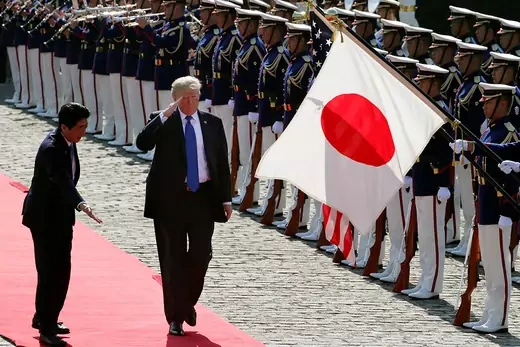
Trump is welcomed to Tokyo by Japanese Prime Minister Shinzo Abe. Koji Sasahara/Pool/Reuters
Trump travels to Japan, South Korea, China, Vietnam, and the Philippines on his longest trip yet. In addition to introducing a new vision for U.S. involvement in the "Indo-Pacific," North Korea and trade dominate the agenda. In Vietnam, Trump attends the Asia-Pacific Economic Cooperation summit and delivers an address reinforcing his America First vision on trade. In Manila, on the sidelines of the Association of Southeast Asian Nations summits, officials from the United States, Japan, Australia, and India convene a quadrilateral meeting of like-minded democracies with concerns about China's rise.
2017
December 6, 2017
Recognizing Jerusalem
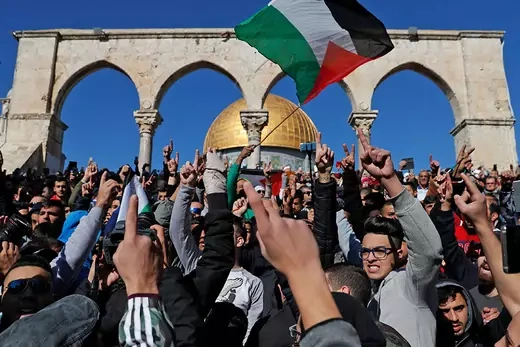
Palestinians protest following the first Friday prayer after Trump's recognition of Jerusalem at the al-Aqsa Mosque compound in Jerusalem's Old City. Ahmad Gharabli/Getty Images
Trump breaks with decades of U.S. policy on the Israeli-Palestinian conflict by recognizing Jerusalem as Israel's capital. He justifies the move as a recognition of the reality that Jerusalem is the seat of Israel's government.
2017 – 2018
December 2017 – February 2018
Releasing Strategic Documents
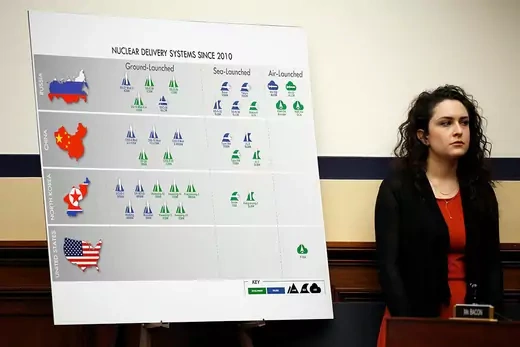
A congressional aide stands next to a slide presenting the administration's 2018 Nuclear Posture Review. Joshua Roberts/Reuters
The administration releases a series of strategy documents, including ones on national security and defense, both of which highlight China and Russia as major strategic competitors. Soon after, it releases its Nuclear Posture Review (NPR), which calls for the creation of two new nuclear missiles for submarines. The NPR also broadens the circumstances under which the United States may use nuclear weapons to encompass cyberattacks.
2018
March 1, 2018 – April 3, 2018
Announcing Tariffs
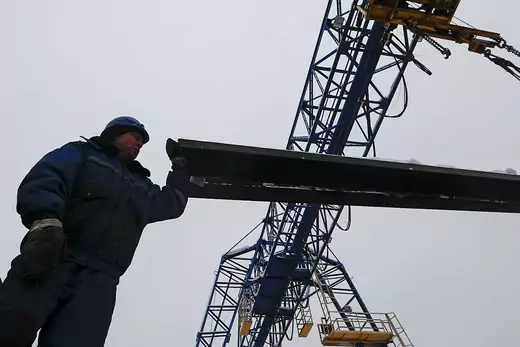
A worker takes control of the loading of steel channels at the Ariel Metal steel trader warehouse in Podolsk outside Moscow, Russia. Maxim Shemetov/Reuters
Citing national security concerns, the president announces on March 1 that the United States will impose tariffs on foreign-made steel and aluminum. The administration imposes the restrictions on China but exempts Canada and other U.S.-aligned states, as well as the European Union, as trade negotiations continue.
2018
March 18, 2018
Accepting Kim's Invitation
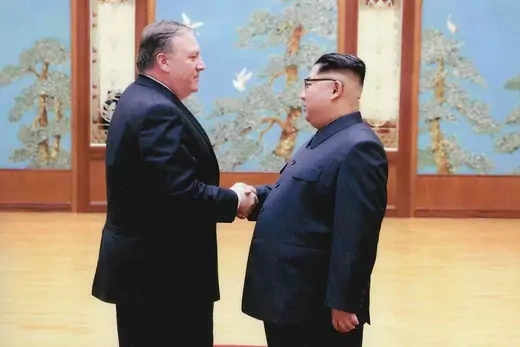
Former CIA Director Mike Pompeo meets North Korean leader Kim Jong-un in Pyongyang. KCNA/Reuters
Trump accepts an invitation from Kim to meet for what would be the first summit between a sitting U.S. president and his North Korean counterpart. South Korean National Security Advisor Chun Eui-yong, in Washington, D.C., announces Trump's decision to accept the invitation. The Trump administration says the summit will be an opportunity to discuss the denuclearization of North Korea.
2018
April 4, 2018 – December 1, 2018
U.S.-China Trade War
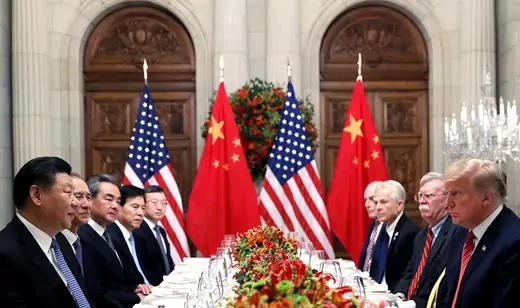
Trump and Chinese President Xi Jinping meet at the G20 summit in Buenos Aires. Kevin Lamarque/Reuters
In early April, China imposes retaliatory tariffs on U.S. products worth about $3 billion, escalating a trade war between the world's two largest economies. By November, the United States has levied tariffs on $250 billion worth of Chinese goods, while China has imposed tariffs on $110 billion worth of U.S. products. At the Group of Twenty summit in Buenos Aires in early December, Trump and Chinese President Xi Jinping agree to a cease-fire, as well as to strike a broader trade agreement within ninety days.
2018
April 13, 2018
A Second Round of Syria Strikes

A Syrian man carries a child in Eastern Ghouta. Nazeer al-Khatib/AFP/Getty Images
Trump orders the U.S. military to strike three facilities in Syria linked to the Bashar al-Assad regime's chemical weapons program. The air strikes, a response to the Syrian government's alleged use of chemical weapons against civilians, are carried out in coordination with forces from France and the United Kingdom.
2018
May 2018 – October 2018
Tightening the Border
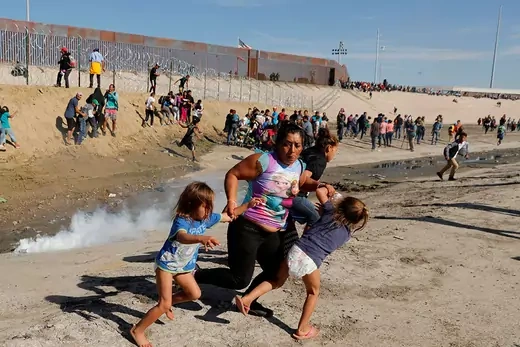
A migrant woman from Honduras, part of a caravan of thousands from Central America, runs from tear gas with her five-year-old daughters at the U.S.-Mexico border. Kim Kyung-Hoon/Reuters
The president institutes a blanket "zero tolerance" policy in May that results in the U.S. Border Patrol separating more than 2,600 children from their parents, before reversing the policy in August. In response to a spike in Central American asylum seekers, Trump sends five thousand troops to "harden the southern border."
2018
May 8, 2018
Withdrawal From Iran Nuclear Agreement
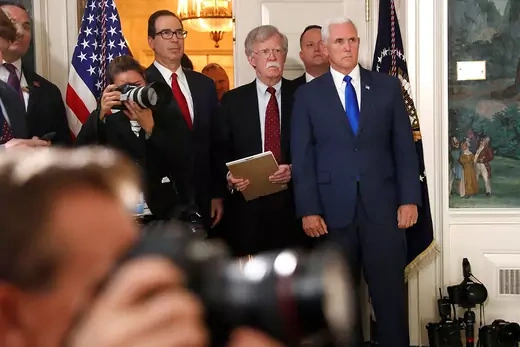
Treasury Secretary Steve Mnuchin, National Security Adviser John Bolton, and Vice President Mike Pence await remarks from Trump on the Iran nuclear accord. Jonathan Ernst/Reuters
The president announces the U.S. withdrawal from the Joint Comprehensive Plan of Action (JCPOA), the 2015 agreement on Iran's nuclear program. Trump says it did not sufficiently curb the country's civilian nuclear program or its regional aggression. Without citing any material Iranian violations, Trump announces that the United States will reinstate two sets of sanctions on Iran that had been waived with the deal's implementation; they will take effect in August and November and range from aircraft imports to oil and petroleum product exports.
2018
May 14, 2018
U.S. Embassy Moves to Jerusalem
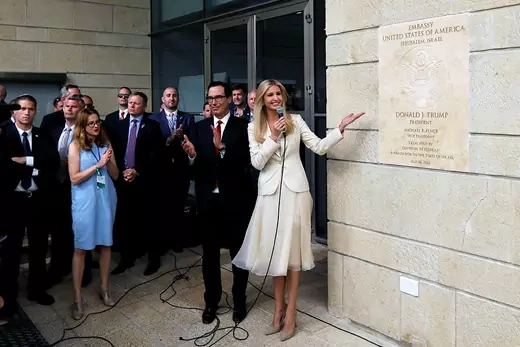
Ivanka Trump and Mnuchin attend the dedication ceremony for the U.S. embassy in Jerusalem. Ronen Zvulun/Reuters
After recognizing Jerusalem as Israel's capital in December 2017, the Trump administration moves the U.S. embassy from Tel Aviv to Jerusalem. The move upsets Arab and Western allies, and brings Washington's neutrality as a broker in the Israeli-Palestinian peace process into question.
2018
June 12, 2018
Trump Meets Kim
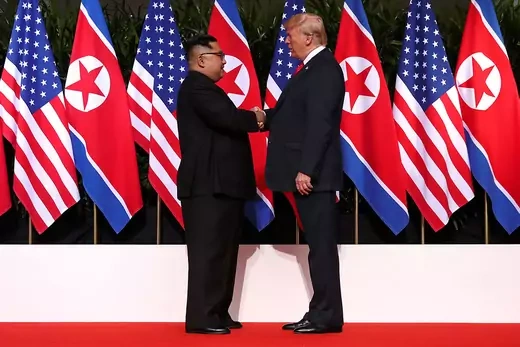
Trump and Kim shake hands during the Singapore summit. Jonathan Ernst/Reuters
Trump and Kim meet in Singapore. Their joint declaration steers the U.S.-North Korea relationship from confrontation to cooperation, but it establishes few means to enforce its ambitious commitments, which include the "complete denuclearization" of the Korean Peninsula.
Source: https://www.cfr.org/timeline/trumps-foreign-policy-moments
0 Response to "The Cia s War on Trump Continued"
Post a Comment